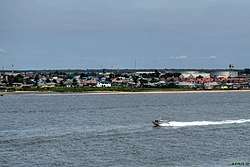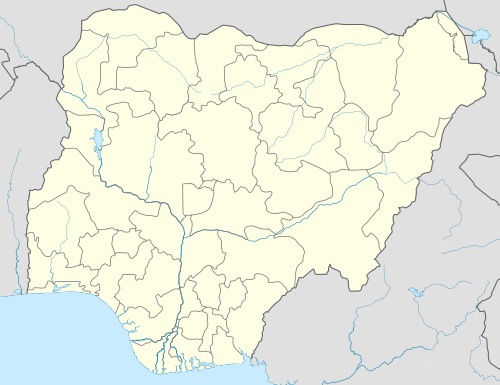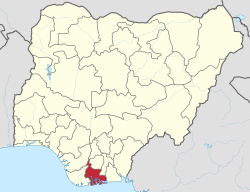Bonny, Rivers
Bonny (or Ibani)[2] is an island town and a Local Government Area in Rivers State in southern Nigeria, on the Bight of Bonny. It is also the capital of the Kingdom of Bonny. Traditionally (especially between the 15th and 19th centuries) it was a major trading post of the eastern delta.[3] Bonny Island is a major export point for oil.[4]
Bonny Ibani | |
|---|---|
Town | |
 Bonny panoramic | |
 Bonny | |
| Coordinates: 4°26′N 7°10′E | |
| Country | |
| State | Rivers State |
| Area | |
| • Total | 249.27 sq mi (645.60 km2) |
| Population (2006) | |
| • Total | 214,983[1] |
| Time zone | UTC+1 (WAT) |
The region produces a type of crude oil known as Bonny Light oil. Much of the oil extracted onshore in Rivers State is piped to Bonny for export. It has the biggest LNG Gas Plant in Nigeria with six (6) trains.
Kingdom of Bonny
The Kingdom of Bonny was a sovereign state in the Niger Delta.
The kingdom, comprising virgin lands and territorial areas, was founded before or about AD 1400. The founding group of the kingdom, who originated within the Isedani lineage of Kolokuma in the Ebeni-toru region (which is itself in the present day Kolokuma/Opokuma Local Government Area of Bayelsa State), was led by four direct descendants of Ebeni. These were Ndoli, Opuamakuba, Alagbariye and Asimini. From these leaders and the entire founding generation of the kingdom evolved the lineage/ward/house system of governance that is currently used to administer the state. The“Amanyanabo”, or monarch (lit. owner of the land);), presided over a chieftaincy system composed of the "Ase-Alapu" (or high chiefs of royal blood) and the “Amadapu” (or district heads).
The four descendants of Ebeni became monarchs of the kingdom in turn, and are remembered today as its founding fathers. After their deaths, their own descendants ruled the kingdom as kings until the reign of King Awusa (alias Halliday) in the early modern era. It was after King Awusa Halliday, the twelfth king of the Bonny kingdom, that King Perekule I succeeded to the kingship. Since his reign, King Perekule's direct descendants have served as successors to the throne established by the founding generation of Bonny.
The Kingdom of Bonny was powerful beginning in the 15th century with the advent of the Portuguese and the following Atlantic slave trade. In the 19th century, it came under increasing pressure from the British to end the trade. It collapsed in the subsequent Bonny civil war of 1869.[5] . A remnant of it continues to exist as a part of the contemporary aristocratic structure of Nigeria. the people of Bonny are still in existence and the town is still occupy with people of different tribes.
See also
References
- "population at LGAs in geohive.com". Archived from the original on 2013-10-19. Retrieved 2013-04-07.
- Dalby, Routledge (1971). African Language Review. Routledge. p. 251. ISBN 0-7146-2690-2.
- "Bonny". Britannica Online Encyclopedia. Retrieved 2009-01-28.
- Frynas, Jedrzej Georg (2000). Oil in Nigeria: Community Rights and Corporate Dominance in Conflict. LIT Verlag Berlin-Hamburg-Münster. p. 79. ISBN 3-8258-3921-4.
- Alagoa, E. J. (1971). Nineteenth Century Revolutions in the Eastern Delta states and Calabar. Journal of Historical Society of Nigeria 5(4). pp. 565–570.
External links
| Look up bonny in Wiktionary, the free dictionary. |
